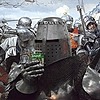HOME | DD
 ornbsrv — Democratic Republic of Oman
ornbsrv — Democratic Republic of Oman

#arabs #alternatehistory #alternateuniverse #cartography #maps #middleeast #mapsandflags
Published: 2023-07-23 08:28:54 +0000 UTC; Views: 831; Favourites: 9; Downloads: 7
Redirect to original
Description
The Dofar War, or the Dofar Uprising, was an uprising in the province of Dofar against the Sultanate of Muscat and Oman from 1962 to 1979, which ended with the victory of the rebels and the establishment of the Democratic Republic of Oman and the Persian Gulf.In 1962, Oman was one of the most underdeveloped countries in the Middle East. Sultan Said bin Taimur, the absolute monarch of Oman, outlawed almost all the progressive achievements of the 20th century and relied on British support in maintaining the elementary functions of the state. The province of Dofar at that time was dependent on Oman and was subjected to severe economic exploitation. In addition, the population of Dofar, who spoke different South Arabian languages, was subjected to even stricter restrictions than other residents of Oman. In 1962, a disgruntled tribal leader, Mussalim bin Nafl, formed the Dofar Liberation Front (FOD) and began receiving weapons and vehicles from Saudi Arabia. On June 9, 1965, the founding congress of the FOD was held, which proclaimed armed struggle "the only effective means" capable of leading to victory over the Sultan of Muscat and the British colonialists. The political declaration adopted at the congress stated that the Front would fight for freedom, social justice, unity and dignity of the Arab nation. The same document spoke about the "Arab" nature of the struggle of the Omani people and expressed confidence that the Arab countries would provide material and moral support to it. The day of the congress, marked by the attack on the Sultan's patrol, was the beginning of an armed struggle.
Rebels in the north of Oman have formed the "National Democratic Front for the Liberation of Oman and the Persian Gulf" (NDFOPZ). In June 1970, they attacked two columns of the VSO marching from Nizva to Izki. The attacks were repulsed, but they convinced many (including the Sultan's British advisers and patrons) that Oman needed new, more effective leadership. The sultan's son, Qaboos bin Said, planned to commit a bloodless coup to replace his autocratic father.
But on July 23, 1970, Sultan Said managed to avoid a palace coup. His personal guard killed Sheikh Barak bin Hamoud, and his son and the organizer of the failed coup, Qaboos, was forced to flee to London, where he headed the fugitive government of the Sultanate of Oman. The despotic leadership of Said bin Taimur continued to oppress the population of Dofar. Soviet-Chinese support grew, and the sluggish war lasted for another seven years, until the Islamic revolution took place in Iran. Shah Mohammad Pahlavi, one of the main allies and protectors of Sultan Said, was overthrown, and along with him, his specialists from SAVAK also left.
The new leadership of Iran, led by Khomeini, joined and recognized the leadership of the Popular Front for the Liberation of Oman and the Persian Gulf. So the Republic of Oman was established, under the patronage of the USSR, China and Iran.

















